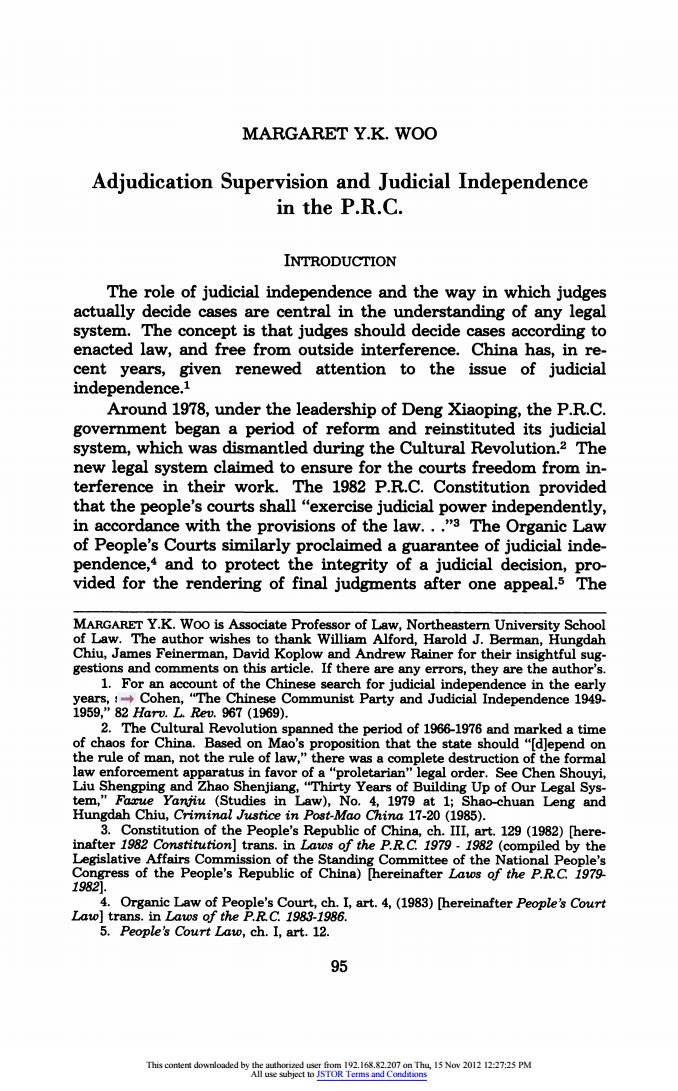正在加载图片...

MARGARET Y.K.WOO Adjudication Supervision and Judicial Independence in the P.R.C. INTRODUCTION The role of judicial independence and the way in which judges actually decide cases are central in the understanding of any legal system.The concept is that judges should decide cases according to enacted law,and free from outside interference.China has,in re- cent years,given renewed attention to the issue of judicial independence.1 Around 1978,under the leadership of Deng Xiaoping,the P.R.C. government began a period of reform and reinstituted its judicial system,which was dismantled during the Cultural Revolution.2 The new legal system claimed to ensure for the courts freedom from in- terference in their work.The 1982 P.R.C.Constitution provided that the people's courts shall"exercise judicial power independently, in accordance with the provisions of the law..."3 The Organic Law of People's Courts similarly proclaimed a guarantee of judicial inde- pendence,4 and to protect the integrity of a judicial decision,pro- vided for the rendering of final judgments after one appeal.5 The MARGARET Y.K.Woo is Associate Professor of Law,Northeastern University School of Law.The author wishes to thank William Alford,Harold J.Berman,Hungdah Chiu,James Feinerman,David Koplow and Andrew Rainer for their insightful sug- gestions and comments on this article.If there are any errors,they are the author's. 1.For an account of the Chinese search for judicial independence in the early years,:Cohen,"The Chinese Communist Party and Judicial Independence 1949. 1959,"82Harv.L.Rev.967(1969). 2.The Cultural Revolution spanned the period of 1966-1976 and marked a time of chaos for China.Based on Mao's proposition that the state should "[d]epend on the rule of man,not the rule of law,"there was a complete destruction of the formal law enforcement apparatus in favor of a"proletarian"legal order.See Chen Shouyi, Liu Shengping and Zhao Shenjiang,"Thirty Years of Building Up of Our Legal Sys- tem,"Faxue Yanjiu (Studies in Law),No.4,1979 at 1;Shao-chuan Leng and Hungdah Chiu,Criminal Justice in Post-Mao China 17-20(1985). 3.Constitution of the People's Republic of China,ch.III,art.129(1982)[here- inafter 1982 Constitution]trans.in Laws of the P.R.C.1979-1982 (compiled by the Legislative Affairs Commission of the Standing Committee of the National People's Congress of the People's Republic of China)[hereinafter Laws of the P.R.C.1979 19821. 4.Organic Law of People's Court,ch.I,art.4,(1983)[hereinafter People's Court Law]trans.in Laws of the P.R.C.1983-1986. 5.People's Court Law,ch.I,art.12. 95 This content downloaded by the authorized user from 192.168.82.207 on Thu,15 Nov 2012 12:27:25 PM All use subject to JSTOR Terms and ConditionsMARGARET Y.K. WOO Adjudication Supervision and Judicial Independence in the P.R.C. INTRODUCTION The role of judicial independence and the way in which judges actually decide cases are central in the understanding of any legal system. The concept is that judges should decide cases according to enacted law, and free from outside interference. China has, in recent years, given renewed attention to the issue of judicial independence.' Around 1978, under the leadership of Deng Xiaoping, the P.R.C. government began a period of reform and reinstituted its judicial system, which was dismantled during the Cultural Revolution.2 The new legal system claimed to ensure for the courts freedom from interference in their work. The 1982 P.R.C. Constitution provided that the people's courts shall "exercise judicial power independently, in accordance with the provisions of the law.. . "3 The Organic Law of People's Courts similarly proclaimed a guarantee of judicial independence,4 and to protect the integrity of a judicial decision, provided for the rendering of final judgments after one appeal.5 The MARGARET Y.K. Woo is Associate Professor of Law, Northeastern University School of Law. The author wishes to thank William Alford, Harold J. Berman, Hungdah Chiu, James Feinerman, David Koplow and Andrew Rainer for their insightful suggestions and comments on this article. If there are any errors, they are the author's. 1. For an account of the Chinese search for judicial independence in the early years, see Cohen, "The Chinese Communist Party and Judicial Independence 1949- 1959," 82 Harv. L Rev. 967 (1969). 2. The Cultural Revolution spanned the period of 1966-1976 and marked a time of chaos for China. Based on Mao's proposition that the state should "[d]epend on the rule of man, not the rule of law," there was a complete destruction of the formal law enforcement apparatus in favor of a "proletarian" legal order. See Chen Shouyi, Liu Shengping and Zhao Shenjiang, "Thirty Years of Building Up of Our Legal System," Faxue Yanjiu (Studies in Law), No. 4, 1979 at 1; Shao-chuan Leng and Hungdah Chiu, Criminal Justice in Post-Mao China 17-20 (1985). 3. Constitution of the People's Republic of China, ch. III, art. 129 (1982) [hereinafter 1982 Constitution] trans. in Laws of the P.R.C. 1979 - 1982 (compiled by the Legislative Affairs Commission of the Standing Committee of the National People's Congress of the People's Republic of China) [hereinafter Laws of the P.R.C 1979- 1982]. 4. Organic Law of People's Court, ch. I, art. 4, (1983) [hereinafter People's Court Law] trans. in Laws of the P.R C. 1983-1986. 5. People's Court Law, ch. I, art. 12. 95 This content downloaded by the authorized user from 192.168.82.207 on Thu, 15 Nov 2012 12:27:25 PM All use subject to JSTOR Terms and Conditions